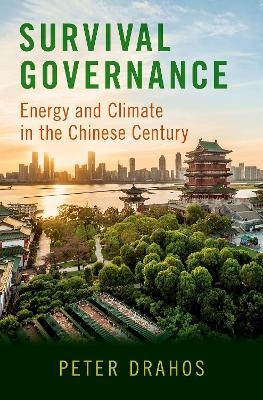
Survival Governance
Oxford University Press Inc (Verlag)
978-0-19-753475-5 (ISBN)
The climate and energy crisis requires a strong state to change the direction, speed, and scale of innovation in world capitalism. There are only a few possible contenders for catalyzing this governance of survival: China, the European Union, India, and the United States. While China is an improbable leader--and in fact the world's biggest emitter of greenhouse gasses--Peter Drahos explains in Survival Governance why this authoritarian state is actually more likely to implement systemic change swiftly and effectively than any other power. Drawing on more than 250 interviews, carried out in 17 countries--including the world's four largest carbon emitters--Drahos shows what China is doing to make its vast urban network sustainable and why all states must work toward a "bio-digital energy paradigm" based on a globalized, city-based network of innovation.
As Drahos explains, America is incapable of reducing the power of its fossil fuel industry. For its part, the European Union's approach is too incremental and slowed by complex internal negotiations to address a crisis that demands a rapid response. India's capacity to be a global leader on energy innovation is questionable. To be sure, China faces hurdles too. Its coal-based industrial system is enormous, and the US, worried about losing technological superiority, is trying to slow China's development. Even so, China is currently urbanizing innovation on a historically unprecedented scale, building eco-cities, hydrogen cities, forest cities, and sponge cities (designed to cope with flooding). This has the potential to move cities into a new relationship with their surrounding ecosystems. China--given the size of its economy and the central government's ability to dictate thoroughgoing policy change--is, despite all of its flaws, presently our best hope for implementing the sort of policy overhaul that can begin to slow climate change.
Peter Drahos is a Professor of Law and Governance at the European University Institute, Florence. He holds a Chair in Intellectual Property at Queen Mary, University of London and is Professor Emeritus at the Australian National University. He is a member of the Academy of Social Sciences in Australia. He holds degrees in law, politics, and philosophy. His publications include A Philosophy of Intellectual Property, Global Business Regulation, (with John Braithwaite), Information Feudalism (with John Braithwaite), and Intellectual Property, Indigenous People and Their Knowledge.
Preface
1. The Argument in Summary
2. Choosing Among Implausible Leaders
3. Technology choices
4. The Geo-Energy Trilemma and its Mis-Management
5. "Winners" and "Losers" in Hotter Worlds
6. China's Limits to Growth
7. Backing the Bio-Digital Energy Paradigm?
8. City Pathways to the Bio-Digital Energy Paradigm
9. India, the Janus Energy Sovereign
10. Survival Governance
| Erscheinungsdatum | 24.02.2021 |
|---|---|
| Verlagsort | New York |
| Sprache | englisch |
| Maße | 236 x 155 mm |
| Gewicht | 499 g |
| Themenwelt | Naturwissenschaften ► Biologie ► Ökologie / Naturschutz |
| Sozialwissenschaften ► Politik / Verwaltung ► Europäische / Internationale Politik | |
| Sozialwissenschaften ► Politik / Verwaltung ► Vergleichende Politikwissenschaften | |
| ISBN-10 | 0-19-753475-9 / 0197534759 |
| ISBN-13 | 978-0-19-753475-5 / 9780197534755 |
| Zustand | Neuware |
| Haben Sie eine Frage zum Produkt? |
aus dem Bereich


